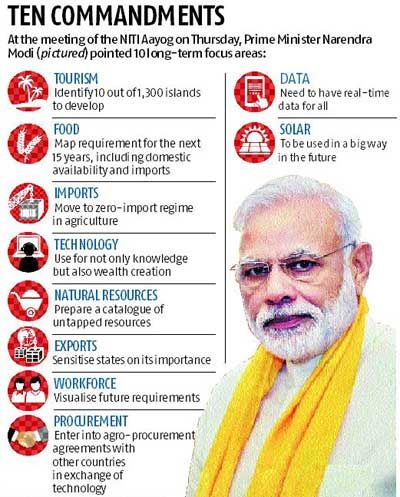Prime Minister Narendra Modi has asked NITI Aayog to frame policies to propel India into the next century.
.jpg?w=670&h=900)
Create a new architecture of policy making that anticipates problems and suggests remedies, Prime Minister Narendra Modi told the NITI Aayog on Thursday.
This was his second visit to the policy-making think tank he established in January 2015, after scrapping the historic Planning Commission.
On Thursday, officials said Modi, who is also the chairman, gave last-minute directions to NITI Aayog Vice-Chairman Arvind Panagariya to change his presentation from a 15-year vision document to flaws in the earlier Plan process.
Then, he told the Aayog to work towards transformational and not only incremental change.
He said the vision document should not only lay the road map of the next 15 years but also form the foundation of the country’s development in the next century.
Even as the possibility of the Goods and Services Tax Constitution amendment Bill being passed in the Rajya Sabha next week brightens, Modi called for big-bang reforms.
Modi asks NITI Aayog to drive transformation “I am a person who experiments because I have the confidence,” he said.

Recounting his somewhat stormy relationship with the Planning Commission, the PM said the erstwhile body was bent on finding flaws in the states.
But, he advised the NITI Aayog to desist from doing so, and become a forum where states raise their problems and solutions are found in spirit of cooperative federalism.
“The state governments are a very vital pillar of India,” Modi said.
He directed the Aayog to make use of the best talent available both in the country and outside to prepare the vision document for transformation.
The PM also told the NITI Aayog to think in advance about a number of issues.
For instance, on agriculture, Modi told the NITI Aayog, to think of the demand for food in the next 15 years, possible sources from where it would come (both domestic and international) and also prepare a clear road map through which these requirements could be met.
Giving the example of pulses, Modi wondered why everyone talked about it when prices shot up.
In its reply, the Aayog is believed to have assured the PM that it will soon constitute a working group of experts to anticipate the requirement for food in the country in the next 15 years and also all available sources.

Modi also spoke of entering into long-term agro-procurement agreements with countries in lieu of technology transfer. Except for these imports, he directed the Aayog to plan towards a zero-import policy for agriculture.
Modi directed the Aayog and all its officials to shed their past lethargy and prepare a 15-year vision document that would lay down the foundation for the next century and take the country forward.
On energy needs, the PM underlined the importance of mapping the country’s energy needs and directed them to prepare a catalogue of untapped natural resources.
He listed mineral wealth, vast untapped solar energy potential and sub-optimally used coastlines as examples.
He also directed them to visualise future workforce requirement and plan accordingly.
The PM talked about the tourism potential in the country, saying there are 1,300 in its territorial waters. He asked NITI Aayog to identify and develop 10 to promote tourism.
Modi urged NITI Aayog to take inspiration from events such as the success of the Give-it-Up campaign, and the widespread positive response from the people to the Swachhta Abhiyan.
Earlier, NITI Aayog vice chairman Arvind Panagariya while pointing towards the flaws in earlier Plan Processes said that lot of laws were made without thinking of the consequences.
During the presentation, NITI member Bibek Debroy said the new vision document should benchmark targets, while Ramesh Chand underlined the need for big reforms in the agriculture sector, where markets should have a direct role.
The meeting was also attended by the Minister of State for Planning Rao Inderjit Singh, members of the NITI Aayog, besides senior officers from the Prime Minister’s Office and the Cabinet secretariat.












 © 2025
© 2025